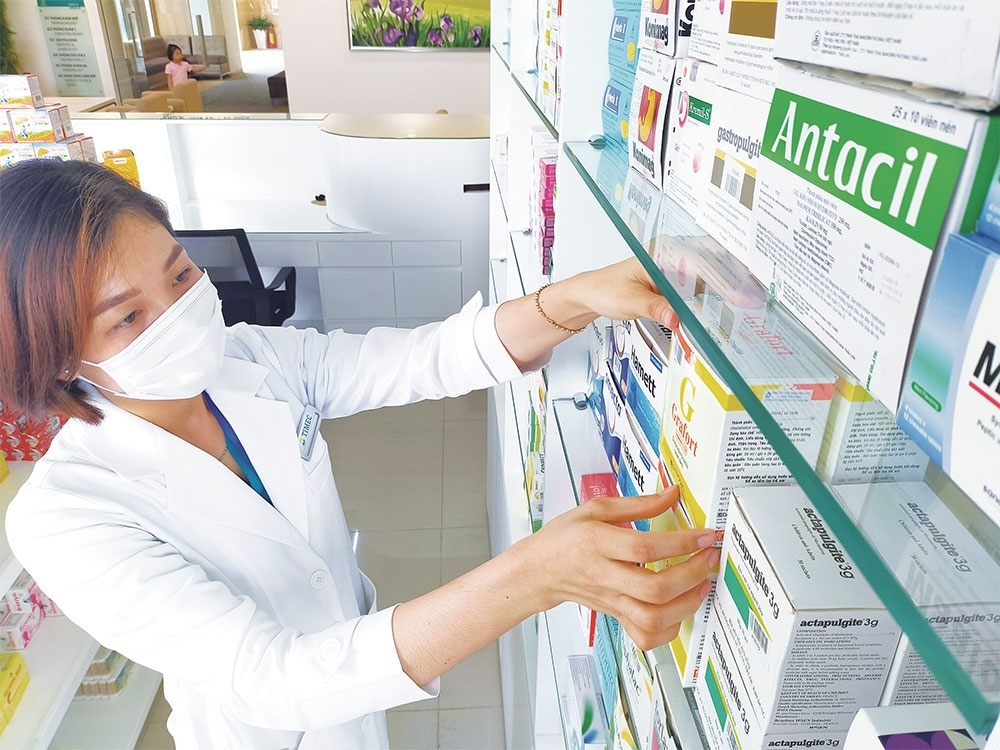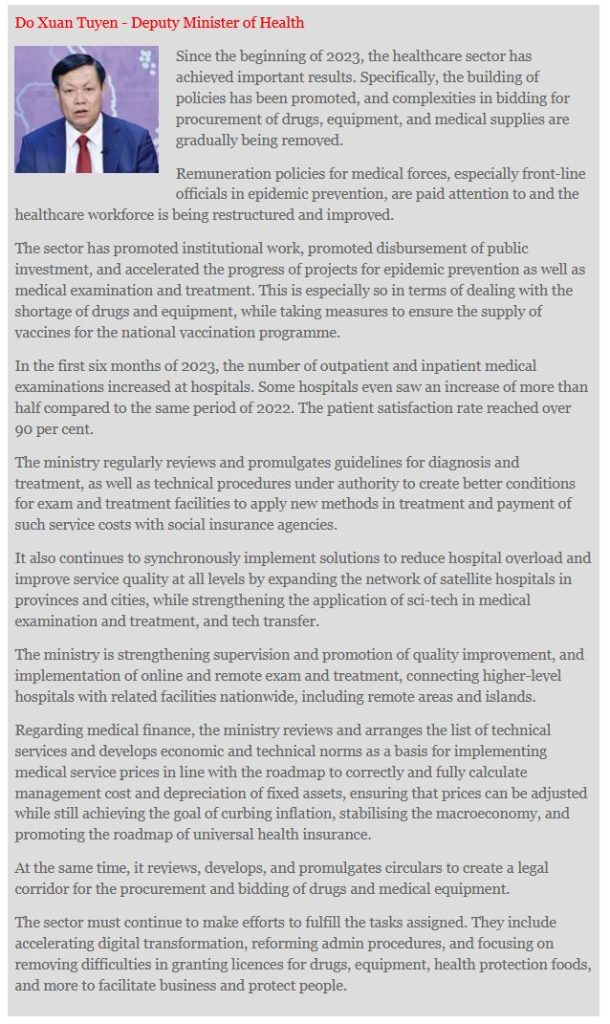February 03, 2024
Life value
STELLAPHARM was born to care and protect patient’s health, to help enhancing their lives and living longer. Your health, for today and for future.
Multinational corporations are giving priority to bringing more innovative medicines to Vietnam to tap into growing local demand.
Pfizer plans to bring numerous innovative medicines to Vietnam over the next four years. This is in line with its global strategy, as the company has made significant progress towards launching 19 new products over an 18-month span, having executed 11 launches so far.

Non-communicable diseases are still on the rise in Vietnam, and thus more choice and more modern answers are required, Photo: Le Toan.
According to Pfizer, the company continues to build momentum, recently attaining key milestones for several products, including the US launches of Prevnar 20 in paediatric patients; as well as US approvals and launches of several other key medicines.
Darrell Oh, country manager of Pfizer Vietnam, told VIR, “Pfizer Vietnam will continue focusing our business where we believe we can have the greatest impact on patients and society – pursuing what we believe to be the most innovative biopharmaceutical therapies and vaccines.”
“More than ever, we believe that the innovative industry can play an important role in rebuilding and improving Vietnam’s health system to better address tomorrow’s challenges with sustainable development,” Oh said. “Pfizer has been and will continue to support and accompany Vietnam in building a biopharmaceutical sector with the purpose of delivering breakthroughs that change patients’ lives.”
Other multinationals are making similar moves. GSK Vietnam and EPLUS Research JSC in July signed an MoU to help local people access the world’s innovative healthcare solutions.
Luis Arosemena, senior vice president for emerging markets at GSK, said, “Vietnam is one of GSK’s six top-priority markets out of a total of more than 100 emerging countries. We will continue to unite science, technology, and talent to bring innovative healthcare solutions to anyone who needs them.”
A representative of Sanofi Vietnam, added, “The company prioritises supply continuity for patient access and consumers, to be proactive engagement through dialogue with authorities to support the growth of the local pharma industry and improve patient access to innovative medicines, vaccines and healthcare products, and to make proactive contributions to amendments, as well as changes of different laws and policies in the coming years.”
Therapies from multinationals in Vietnam have the greatest influence on patients and society, which is facing a huge disease burden. Non-communicable diseases (NCDs) are also on the rise.
According to Vietnam’s Ministry of Health (MoH), recent hospital reports indicate that 65-75 per cent of inpatients suffer from NCDs. At hospitals, cancer treatment departments, and respiratory and cardiovascular departments are full of patients. Mental health is also a huge challenge.
Dr. Tran Quoc Bao from the Department of Preventive Medicine under the MoH said the burden of NCDs was huge, causing about 80 per cent of deaths in Vietnam.
Rare diseases are also a burden. Statistics from the MoH showed that in Vietnam, there are currently about 100 rare diseases, and six million people are suffering from them, meaning that one in 15 people have a rare disease, of which up to 58 per cent are found in children.
Multinationals now seek to offset declining sales, and their moves and strategies in Vietnam are aligned with this. In particular, Pfizer Inc. in August reported its latest financial results, recording second-quarter sales of $12.73 billion, down 54 per cent from the same period a year ago.
Pfizer blamed the contraction in revenues for the anticipated decline in Paxlovid and Comirnaty sales. Accordingly, the company’s COVID-19 vaccine raked in $1.49 billion in sales, down 83 per cent from the year-ago quarter. Pfizer’s antiviral pill Paxlovid posted $143 million in revenue, a drop of 98 per cent.
Pfizer and rival drugmakers like Moderna have seen a steep decline in such sales this year. Pfizer, Moderna, and Novavax are preparing for the US to shift such products to the commercial market, which means those companies will start selling vaccines and treatments directly to healthcare providers this fall.
AstraZeneca released its second quarter earnings in July, announcing that total revenue rose to $11.42 billion from $10.77 billion in the second quarter of 2022. The revenue growth represented a step in the right direction for AstraZeneca, which has sought to offset declining sales. AstraZeneca is banking on eight cancer trials this year, including TROPION-Lung01.
In its own second quarter earnings report also released in July, Sanofi disclosed net profit of $1.58 billion, a jump over the $1.29 billion from the same period last year. Sales dropped, however, from $11.15 billion in the second quarter of 2022 to $10.9 billion in 2023.
More positive changes are expected by some in order to propel pharma prospects forward.
“We look forward to the amendment of pharmacy law and creating faster access and availability of new medicines, improving the business environment, and avoiding the introduction of policy measures that may create more barriers to patient access,” said the representative of Sanofi Vietnam.
“By doing so, patients in Vietnam will benefit from timely access to innovative medicines, and Vietnam can build a strong foundation for the development of an innovative pharmaceutical industry.

Source: Vietnam Investment Review
About STELLAPHARM
Stellapharm is one of leading generics pharmaceutical companies and strong producer of anti-viral drugs in Vietnam. The company established in Vietnam in 2000; and focuses on both prescription drugs and non-prescription especially in cardiovascular diseases, antiviral drugs, anti-diabetics drugs, etc. and our products are now used by millions of patients in more than 50 countries worldwide.
The company is globally recognized for its quality through our facilities have been audited and approved by stringent authority like EMA, PMDA, Taiwan GMP, local WHO and others.
Additional information for this article: Stellapharm J.V. Co., Ltd. – Branch 1
A: 40 Tu Do Avenue, Vietnam – Singapore Industrial Park, An Phu Ward, Thuan An City, Binh Duong Province, Vietnam
T: +84 274 376 7470 | F: +84 274 376 7469 | E: info@stellapharm.com | W: www.stellapharm.com
Innovative pharmaceuticals are emerging as a game-changer reshaping the industry, which is urging Vietnamese authorities to have supporting policies to tap into new potential. At Pfizer, new innovative vaccines are being studied to keep abreast of new viruses and bacteria that threaten human lives and livelihoods. They include a two-in-one flu and coronavirus jab, and
The “Healthcare Innovation Forum”, a platform that brings together local and international experts to discuss and share experiences on innovative solutions in building a sustainable healthcare system worldwide and to drive the adoption of innovative approaches and technologies to transform healthcare in Vietnam. Diseases never stop developing, nor does innovation to deal with these obstacles.
Vietnam has set a target of becoming a high-value pharmaceutical production center in the region under its strategy for the development of the pharmaceutical sector by 2030 with a vision to 2045. Under the strategy, which was approved by Deputy Prime Minister Tran Hong Ha on October 9, Vietnam will strive to develop its pharmaceutical
It is critical for pharmaceutical companies to improve competitiveness with a focus on research and development (R&D), production technology and digitalisation. According to experts, this will help them expand their shares in the domestic market which remains being dominated by imported drugs and extend their international reach.Vietnam’s pharmaceutical market has significant potential. The Ministry of